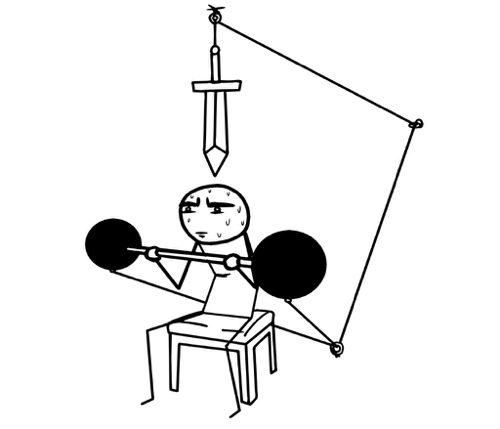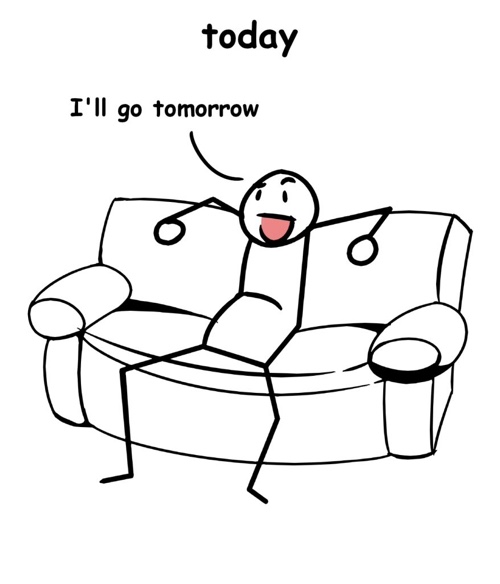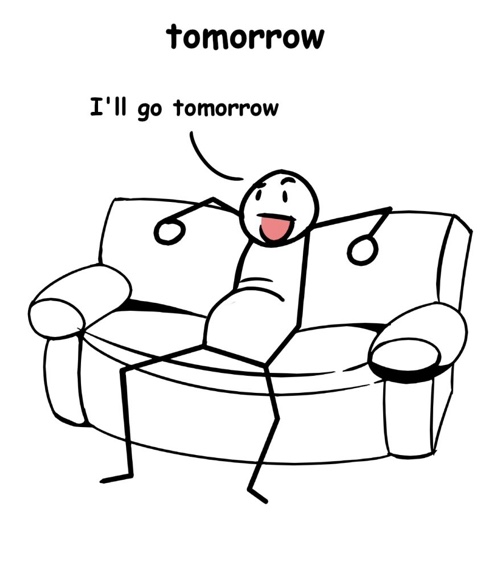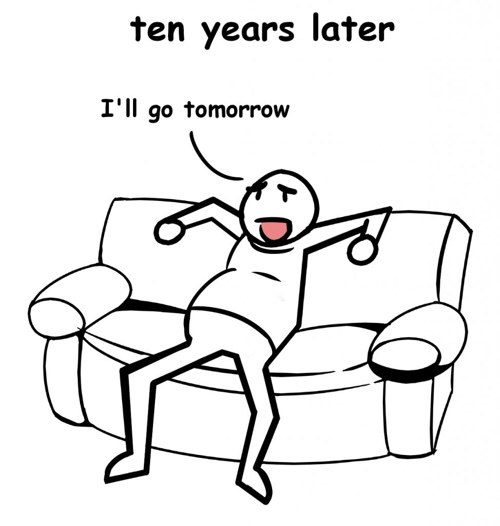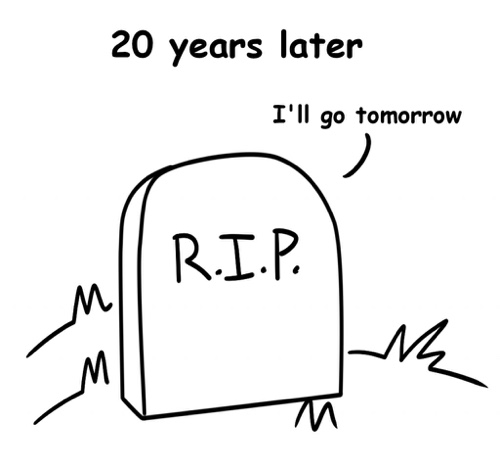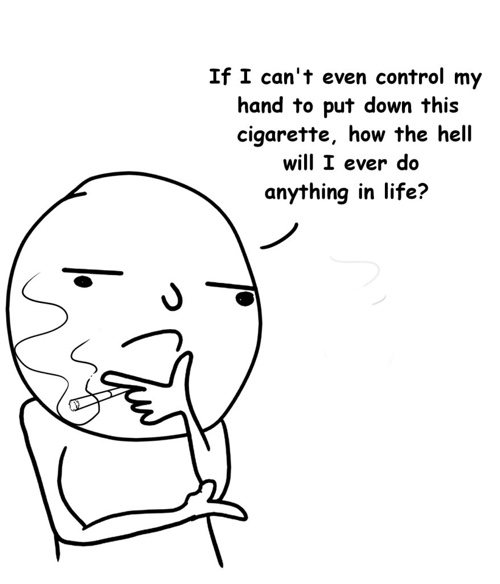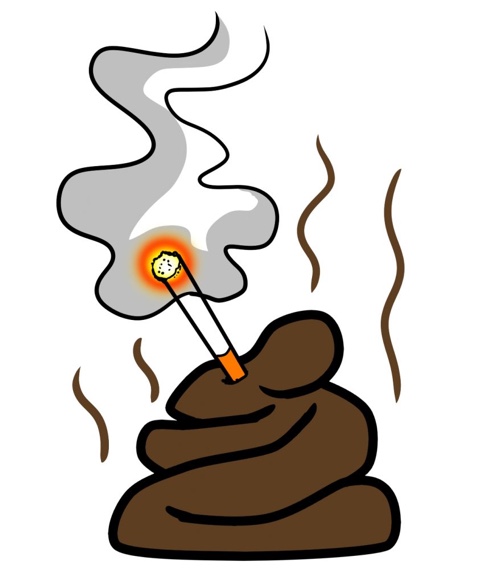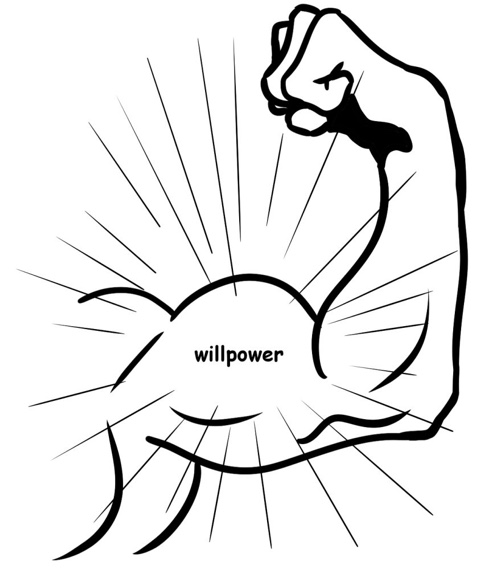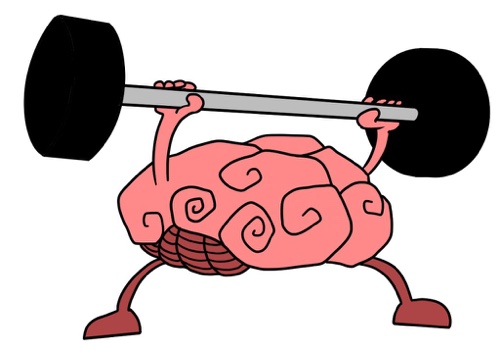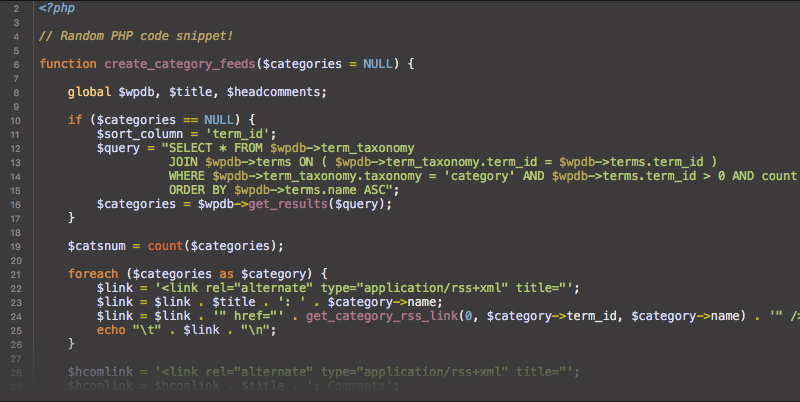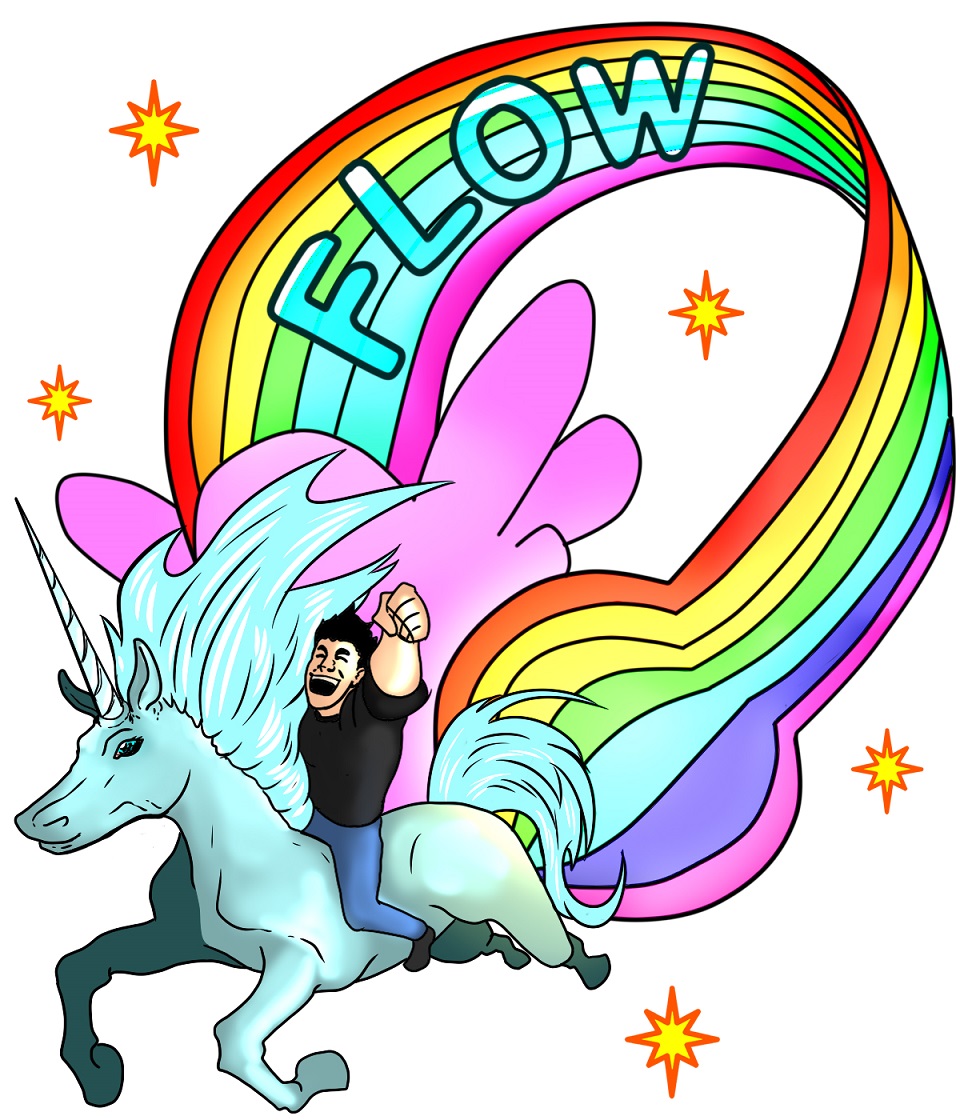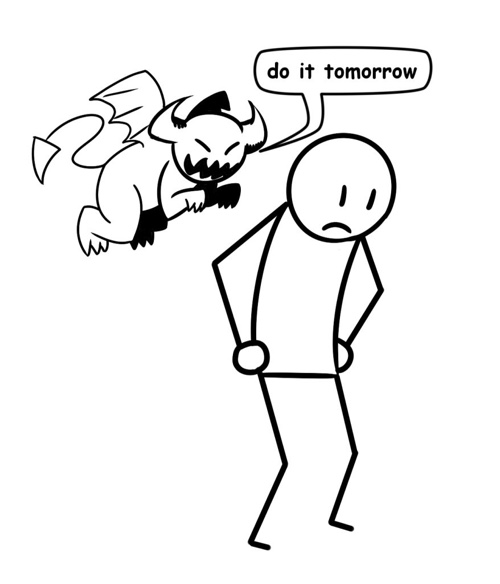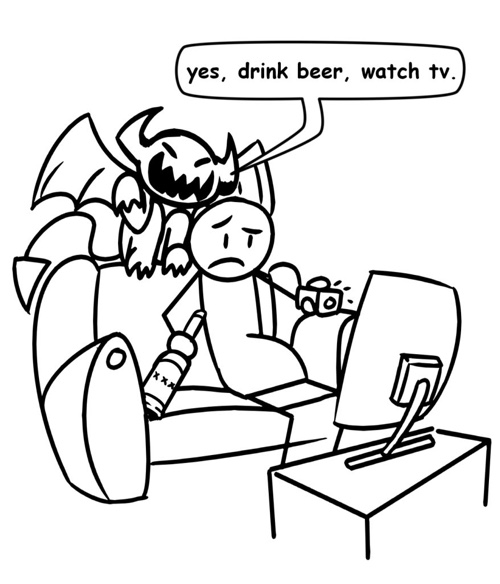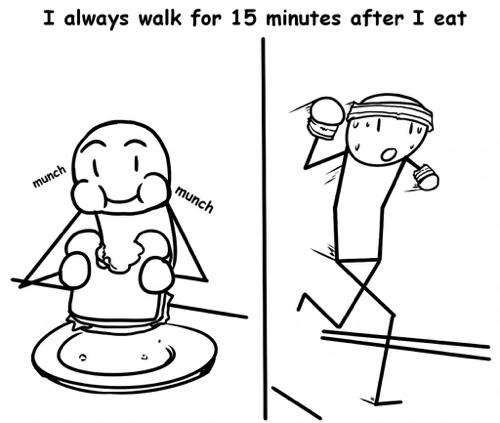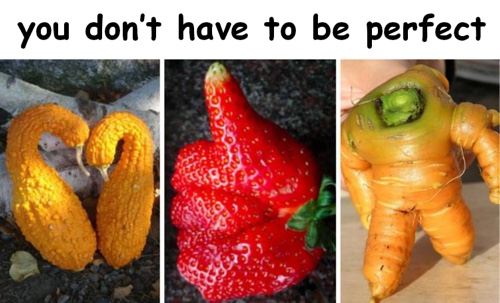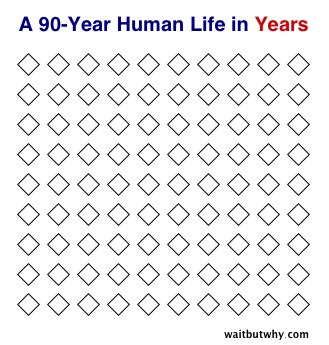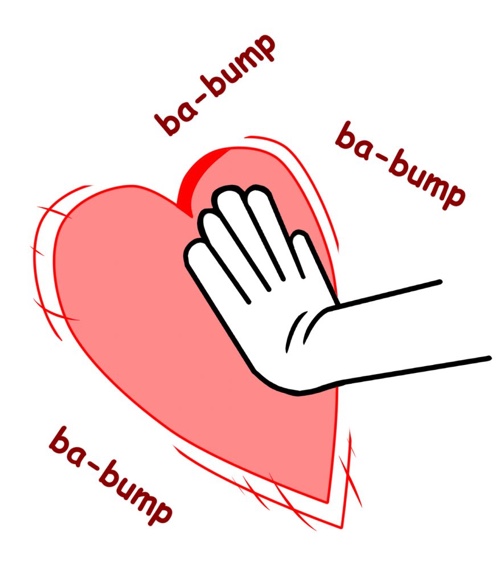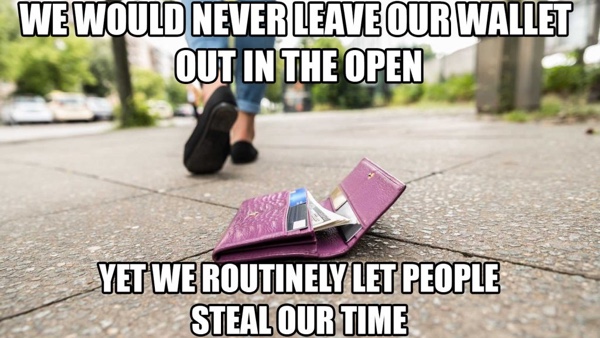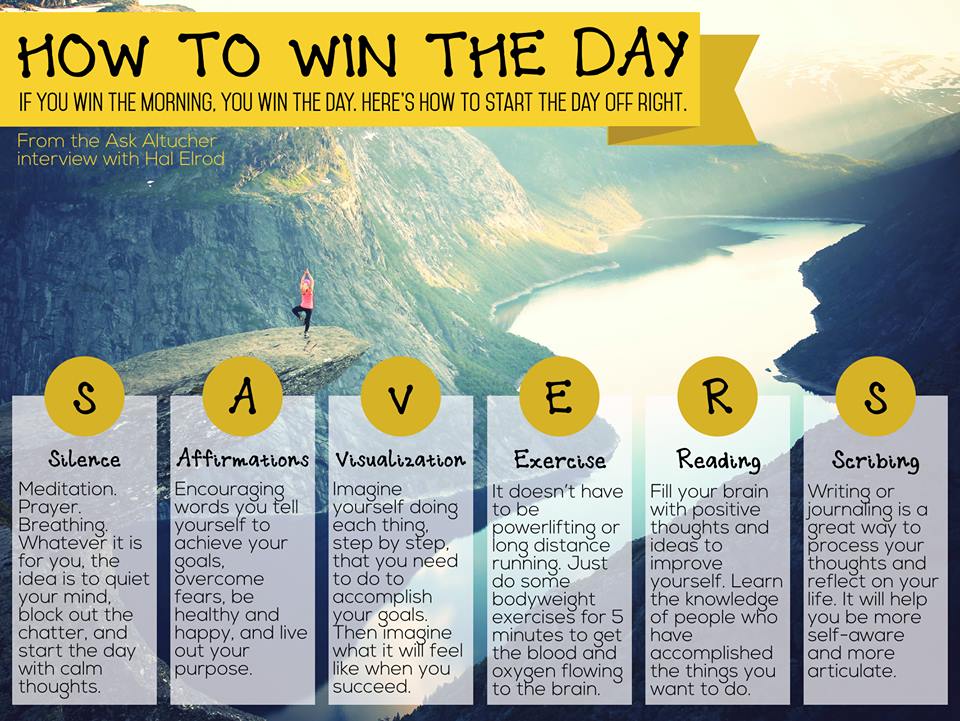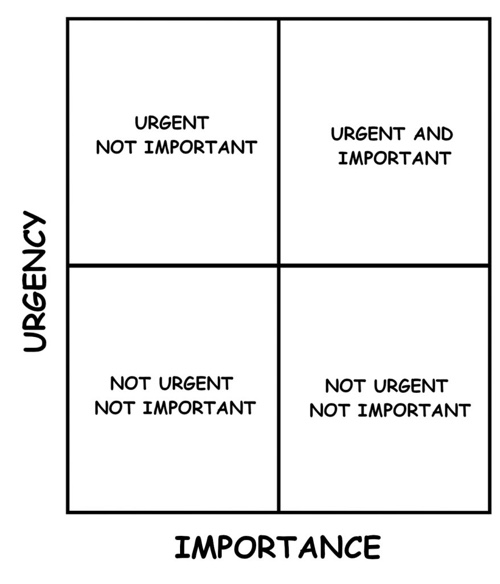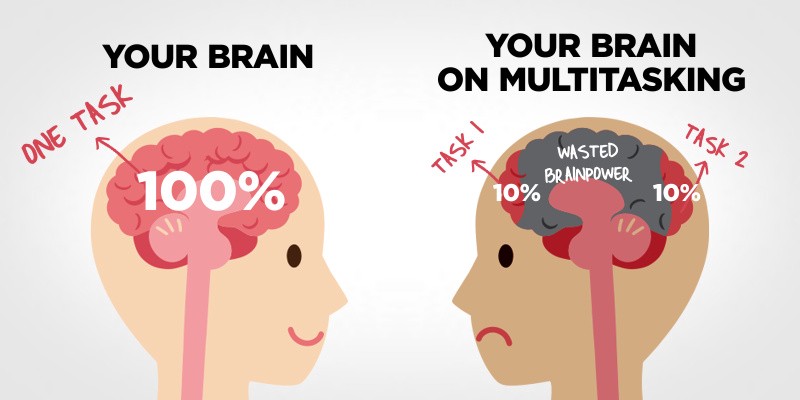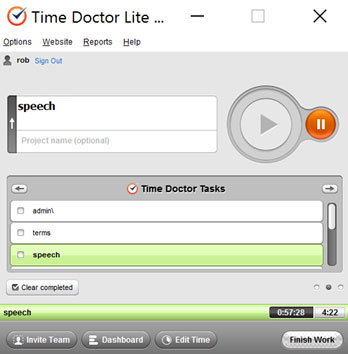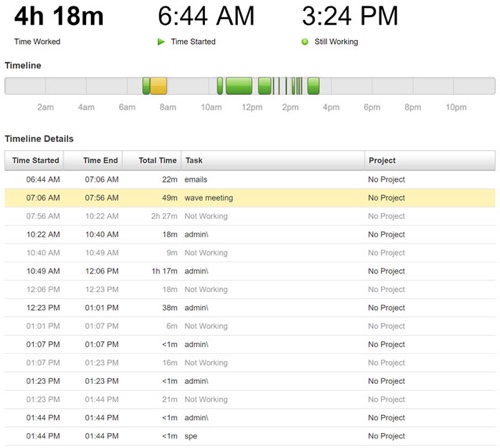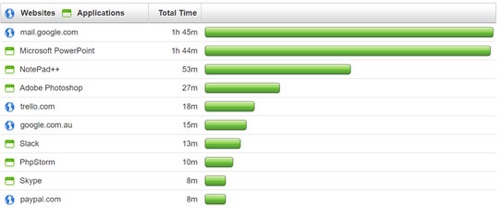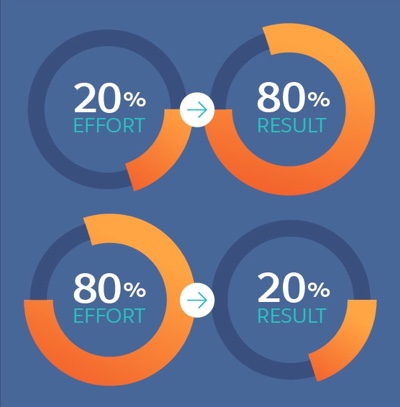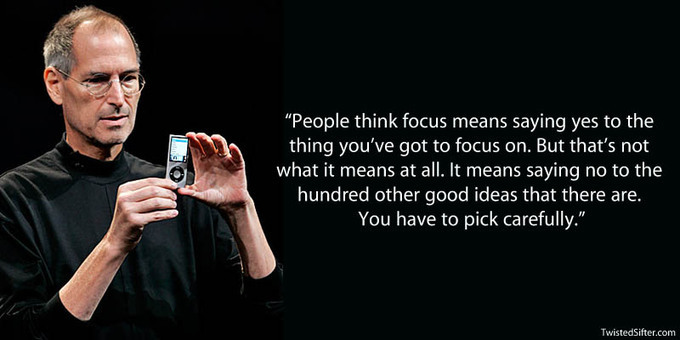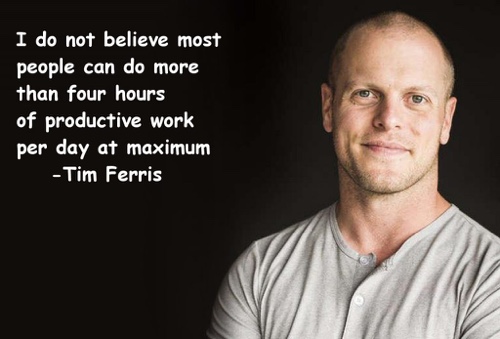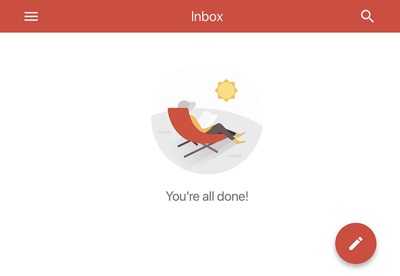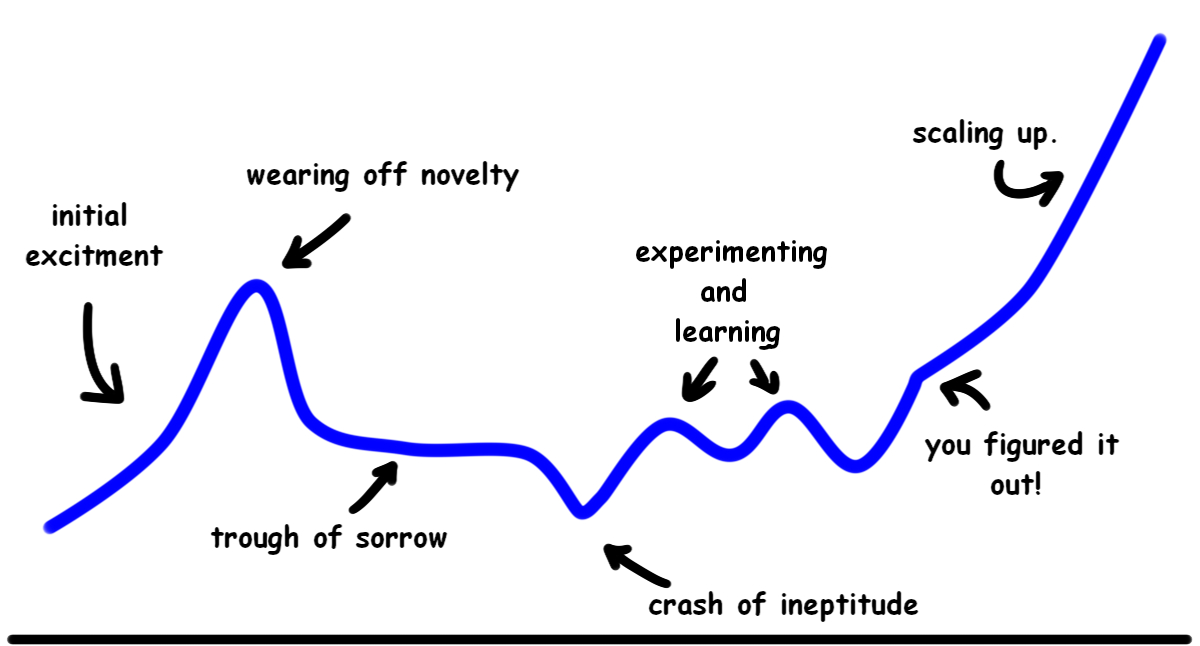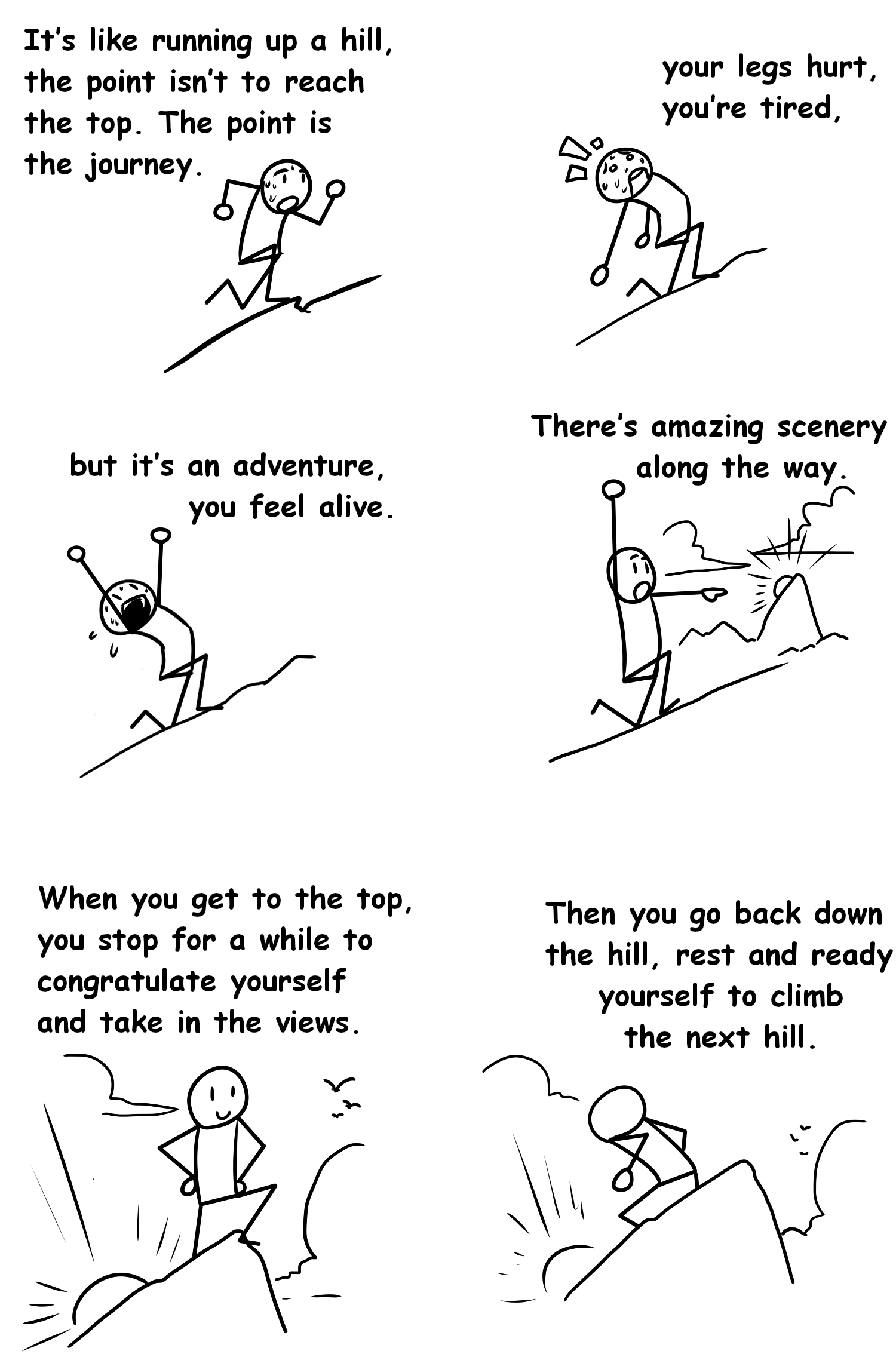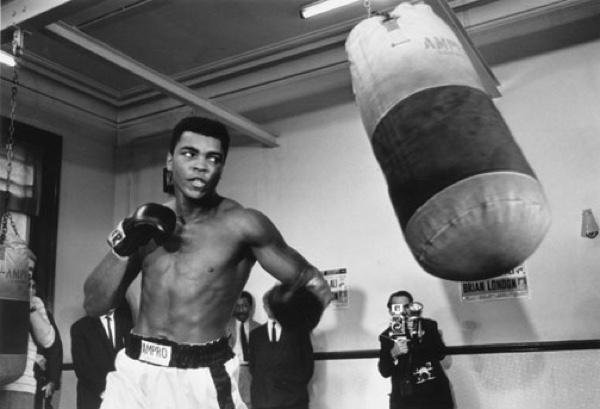Friend: I’d rather die than miss a day at the gym
Me: That’s a bit extreme, don’t you think?
Friend: What I found is, if I miss one day, I will miss every day. Whatever set of excuses I have today that stop me gyming, they are going to be there every day.
Me: Yep I always have the same excuses: I am too busy, I am too tired. There’s never a convenient time.
Friend: Right, so since I’ve decided to go to the gym, I am going to stick to it, because if I don’t, I will fail at my larger scale goals. I say to myself: if I can’t make myself do this, how am I going to live my dreams? If I can’t carve out time and do the work, then how the hell will I achieve anything? I’ll be completely unfit and die. I might as well die right now, because that’s what I am doing to myself every time I give some bullshit excuse.
We procrastinate because we overvalue the present and undervalue the future.
We’re drawn to instant gratification. Sitting on the couch and watching TV is instantly enjoyable. Getting into shape at the gym takes a long time.
We not do understand the future consequences of our actions. We feel like skipping the gym today is a small thing. We don’t realize that tomorrow we’ll have the same excuses, we’ll never end up going.
We defeat procrastination by realizing:
If I do not take action today, then I will never achieve my dreams for tomorrow.
You can force yourself into doing anything by putting your dreams on the line.
One of the hardest things I did was to quit smoking. I tried and failed multiple times. I cut down to only a few a week. I made it a rule to only smoke around friends. Nothing worked, light smoking turned into heavier smoking and I always fell back into half a pack a day.
Then I got my ego involved. I said to myself: I have all these dreams, I want to build a business, solve big problems, change the world.
What a useless piece of crap I would be.
From that day forward every time I felt like a cigarette, there would be this feeling of dread. I knew that if I took just one puff, my dreams would be over.
It’s been 7 years and I have never touched a cigarette.
Willpower is something that you can train. Willpower is like a muscle, it gets stronger the more you exercise it.
After I quit smoking the cravings were really strong. There was a lot of mental pain involved in stopping myself from lighting a cigarette. But as the months passed, it became easier and easier. Today I don’t have the urge to smoke at all.
It’s the same with any task that requires brain power, it gets easier the more you do it. Your brain is a muscle. It gets stronger the more you use it.
When I just started learning how to code websites, it was really hard. I struggled through hours of tutorials by computer nerds with Russian accents. Code seemed so alien to me.
I kept on coding my website. Thing started coming together, I finished my first prototype. It was crappy, but hey it worked!
When I got to 50% completion, I could imagine what the completed website would look like.
I really wanted to finish. I got addicted. I spent days on end coding. I’d forget to eat meals. I was in the zone. Time just flew by and before I knew it, my website was finished.
I got into flow.
According to psychologist Mihály Csíkszentmihályi, flow is when a person doing an activity is fully immersed in a feeling of energy, focus, and enjoyment. Flow is characterized by complete absorption in what one is doing and loss of one’s sense of space and time.
The more you work on something, the more you exercise your willpower, the easier it is to get into a state of flow. Then the work becomes easy.
But if we don’t exercise our willpower, if succumb to our addictions, then it becomes a lot harder to get back on track. That’s why light smoking never worked me for me. If I had let myself have a few cigarettes, it would have weakened my willpower, and I led me to have more.
Commit 100%
It’s easier to commit 100% to quitting than to smoke in moderation. Because you don’t have to make the decision anymore. Otherwise you’ll be like ‘today’s an exception, my friends are smoking,’ everything becomes an exception.
Do not make a backup plan.
Plan B only distracts you from plan A.
It's Plan A or die trying
When the ancient Greeks got to Troy the first thing they did was burn the boats. So the only way they could survive was to attack Troy, plunder the city for materials, and then build the boats they needed to go back home.
If you burn the boats you are going to win or you are going to die trying.
Will Smith puts it like this:
I am not afraid to die on a treadmill. I will not be outworked period. You might have more talent than me. You might be smarter than me. But if we get on a treadmill together, there’s two things: You’re getting off first, or I am going to die.
When I started my first business. A big reason why it succeeded was because I had no other option. I dropped out of university. I’ve been fired from two companies already. And they were internships. Like who gets fired from an internship? I realized I was unemployable. My business had to succeed. It was succeed or die trying.
One year into my business and things were not going well, we weren’t making money, and the investors wanted their money back. I thought about quitting, but I couldn’t, I was unemployable. So I kept going. I moved in with my parents and lived on $200 a week. I worked my ass off, tried lots of different things, and after 8 months the business started taking off. I succeeded because giving up was not an option.
There’s a force that acts against our willpower, its called:
Resistance
Resistance will tell us anything to keep us from doing our work.
Do it tomorrow, it’s too hard, I am not qualified, what if I screw up? I need to feed my cat. Resistance will rationalize, place distractions, inspire fear and anxiety, and raise the voice of our inner critic.
Resistance distracts us with things that give us a thrill without us having to put in any effort. Shopping, eating, TV, internet, Facebook, video games, gambling, sex, drugs. Any kind of artificial thrill is resistance, we can tell by the measure of hollowness we feel afterwards.
Resistance makes us feel restless. We can’t get no satisfaction. There’s guilt but we can’t put our finger on the source. A low-grade misery pervades everything. We will never cure our restlessness by contributing our disposable income to the bottom line of Bullshit, Inc., but only by doing our work. – Adapted from War of Art by Steven Pressfield
We can combat resistance by creating:
Habits
Everyday I try to wake up, exercise, and then sit down to write for 2 hours. I’ve stuck to it long enough that it has become easier. The voices of resistance are still there, but they are weaker.
Here’s how to create a habit:
1. Start with small commitments. Getting started is hard, so you want to make it as easy as possible. Want to get fit? Commit to exercising for 1 minute a day. Push ups, squats and sit ups. Stop after 1 minute. All we are trying to do is build up consistency. After two weeks of doing this every day, you will want to exercise for longer.
2. Set a time every day. Exercise at 8 a.m. It’s easier to remember to do something if we do it the same time everyday. Or pick something you already do everyday. For example, after I eat lunch I will go for a walk. This is easier because eating lunch acts as a cue to remind you to exercise.
3. Make cues for good habits really obvious. Want to learn to code? Set your browser’s home page to CodeAcademy.com. Want to get fit? Leave exercise equipment lying around the house.
4. Hide cues for bad habits. Disable your internet when you’re doing work using freedom.to. Throw out your TV. Stop buying ice cream.
5. Couple enjoyable activities with hard activities. For example, I will only listen to the audio-books that I really like when I exercise. Struggling to work? Try working at that beach side cafe you love.
6. Never miss twice. The first time you miss a commitment is fine. It’s the spiral of repeated mistakes after that, that ruins you. The breaking of a habit doesn’t matter if you can reclaim it quickly. The problem is not slipping up. The problem is thinking if you can’t do something perfectly then you shouldn’t do it at all.
If you really want to achieve something then:
Turn pro
Consider the differences between the Pro and the amateur.
We’re all professionals in one area of our life: our jobs. We show up everyday. We show up no matter what. We stay on the job all day. We’re committed over the long haul. The Pro takes the time to master technique. The stakes are real, this is about survival and feeding our families. The Pro gets paid.
The amateur doesn’t show up everyday. Does not show up no matter what. Does not stay at the job all day. Is not committed over the long haul. There’s nothing at stake. Amateurs don’t get paid.– Adapted from War of Art by Steven Pressfield.
If you want to get things done, develop this kind of unshakeable work ethic. Turn Pro.
Once you’ve turned Pro, you:
Value your time
Time is our most valuable asset. Once you’ve spent it, you can’t get it back.
This is the amount of time you have, each box represents one year.
It’s not much, and you’ve already spent some of the boxes.
Hold your hand to your chest and feel your heart.
That is the feeling of time slipping away. You will never get those beats back.
Value your time like you value money. Think about how much attention we give to money. Working hard to make money, saving money in the bank and finding worthy investments for your money.
Think about all the time we waste everyday. You wouldn’t waste money like that would you? And our time is more valuable than money.
If we want to live a productive life we need to plan how we spend our time as carefully as we plan how we spend our money.
To make the most of our time, we:
Wake up early
Aim for 6:30am.
In a poll of 20 fortune100 CEOs, 90% said they wake up before 6 am. This is because most people are way more productive in the morning compared to late at night. Late at night you’d be watching TV, relaxing, drinking, winding down. Whereas if you wake up in the early morning you can fit in exercise, meditation and goal setting.
Hal Elrod recommends a morning routine called S.A.V.E.R.S to help you get the most out of your day.
This is my ideal morning routine:
6:30am: Wake up, brush teeth, bathroom, get ready
6:45am: Meditation. I stare at a wall for 20 minutes
7:05am: Gratitude. I think of 3 things I am grateful for today
7:10am: Loving kindness meditation link to: https://jackkornfield.com/meditation-lovingkindness/
7:15am: Exercise, go for a run and listen to audiobooks, also do pushups and squats
8:15am: Drink green vegetable juice, it’s a much cleaner high than coffee. Shower, get dressed
8:30am: Start work
Calendar your entire day
Use a calendar and schedule your entire day into 15-minute blocks. Use this not just for appointments, but workouts, email blocks, thinking time, family time.
Carefully decide what goes on your calendar, this is how you will spend your time. If it’s on the calendar, it gets done no matter what. If it’s not on the calendar, then you won’t waste time on it. Most CEOs have full time assistants just to manage their calendar. It matters.
I usually plan out my entire week’s calendar in advance.
Here’s what my calendar for today looks like:
8:30am: Write articles for Life Club
10:30am: team meeting for Contactout
11:00am: team meeting for Life Club
11:30am: free time for admin, email and random tasks
12:30pm: lunch
1:30pm: work on marketing and traffic generation
3:30pm: chat with my head of sales
4:00pm: free time thinking and reflecting
6:00pm: finish day
Work on the first important thing first thing in the morning
Pick the task that will have the biggest impact on your business and work on that for the first 2 hours of your day. The first 2 hours are the most productive according to Dan Ariely a psychology professor at Duke.
I try to reserve the morning for doing “real work.” I find I can focus more in the morning whereas it’s harder to get focused after having been bombarded by meetings.
–Nathan Blecharczyk, Airbnb cofounder
The most important task for me at the moment is writing articles so I do it first.
Schedule 2 hour time blocks for everything that is important
My two most important things are writing and traffic generation, so I’ve scheduled 2 hour time blocks for each of them. I do this so my day does not get crowded up by urgent tasks.
There are 4 types of tasks:
If I don’t schedule time for everything that is important, then my day is going to be crowded with things that are urgent, but not necessarily important. E.g email, social media messages, “got a minute?” requests from my team.
Things which matter most must never be at the mercy of things which matter least.
–Goethe
Treat your time blocks as if they were appointments with your doctor
Don’t miss your time blocks. They are critically important to a solid work ethic and your success.
During your time block, focus solely on the task at hand. Block out distractions. Turn off your email, phone and social media notifications. If you don’t need the internet, disconnect it too. Try using freedom app to block social media.
The reason we block out 2 hours to work on one task is so we can really get into it.
Multitasking doesn't work
It takes us a period of time to get familiar with a new task. If we keep switching tasks then we never get deep enough into anything to be productive. Dr Cal Newport explains in his book Deep Work, that if you switch tasks “your attention doesn’t immediately follow – a residue of your attention remains stuck thinking about the original task.”
That’s why it’s better to spend 2 hours working on just one thing. Feel free to take a break in between the 2 hours for 10min to recharge.
Use time doctor to track your time
Time Doctor is like a stopwatch on your computer, press start when you’re working and press stop when you’re not.
It will give you reports of how much time you work, what tasks you worked on and what websites and applications you used.
When I first started using Time Doctor I realized that half the time I spent in front of my computer was not productive. I thought I was working but I was actually on social media, or reading blogs, or watching youtube.
It’s really important to measure your productive work hours. Otherwise you won’t know how productive you’ve actually been. You can’t improve what you don’t measure.
I set myself a goal of 30 productive hours a week, excluding social media, news, blogs, etc.
Schedule in free time for thinking and reflecting
Jeff Weiner the CEO of Linkedin, schedules “do nothing” time everyday. This is time for thinking, reflecting and scheduling future tasks.
“My schedule was becoming so jammed with back-to-back meetings that I had little time left to process what was going on around me or just think. I realized not only were these breaks important, they were absolutely necessary in order for me to do my job.”
If you keep working without reflecting you’ll hit a lot of dead ends. You’ll be working really hard but not working smart. It’s good to stop once in a while, take a high level perspective and ask:
Am I working on the most important thing?
According to the 80-20 principle: 80% of the results come from 20% of the work.
For example for most businesses 80% of sales comes from 20% of clients.
So it’s important to ask ourselves:
What’s the one thing I can do, such that by doing it, everything else will become easier or unnecessary? – the ONE thing
What task could I be working on that would produce the biggest results?
Where do I have the most leverage?
Here’s how I went about finding my most important thing:
When I first started business, I was doing everything myself, figuring out marketing strategies, getting traffic, earning income. Making money was the most important thing.
Then I realized I can’t do everything myself, I’ll achieve way bigger results by working together with other people. So my most important thing became hiring a team.
After a while my business grew bigger, and I lost interest in trying to make more money. I had enough to live comfortably. So I became interested in reading, learning broadly about life, and sharing what I learnt with the world by writing. So now my most important thing is writing.
Your most important thing will change all the time, so it’s important to keep asking yourself: am I working on the most important thing? Refer to the article on what should I do with my life?
In order to work out what is most important:
Write down all your ideas
Here’s what Richard Branson, founder of Virgin Group has to say about note taking:
I can’t tell you where I’d be if I hadn’t had a pen on hand to write down my ideas (or more importantly, other people’s) as soon as they came to me. Some of Virgin’s most successful companies have been born from random moments – if we hadn’t opened our notebooks, they would never have happened. If you don’t write your ideas down, they could leave your head before you even leave the room.
Once you have a lot of ideas:
Get really good at saying now
Everything you say yes to means you are saying no to something else. Understanding that there is always an opportunity cost will make you be really careful about what you decide to do.
Ask yourself:
Can I outsource it?
Outsource any task that is repetitive and doesn’t require a lot of thought. For example: data entry, online research, office admin, and calendar scheduling. Write instructions and give the task to someone else to do. Tony Robbins was a teenager when he hired his first assistant. You should only be working on tasks that require thinking. Outsource all mechanical tasks.
If somebody else can do the task satisfactorily, then let them do it. You might be able to do the task better yourself, but your time is more valuable.
You’ll be surprised at how much of your life you can outsource. Best selling author Tim Ferriss hired freelancers to pretend to be him on online dating sites and set up dates. The freelancers lined up 30 coffee dates over a weekend. Tim set all the dates at 3 coffee shops which were next door to each other. So Tim would spend 30 minutes at a coffee shop and then go next door to his next date. Through this experience Tim managed to meet a girl who went on to become his girlfriend.
Read four hour workweek and biz30 blog on how to outsource effectively.
You don't need to work that hard
Developing and unshakeable work ethic is essential, but that doesn’t mean you need to grind 24/7. Tim works 4 productive hours a day. He has written 3 new york times best sellers and advises companies like Uber and Facebook. His net worth is 100 million.
People say they work 8 hours a day but in a study of 2000 workers, the average worker is only productive for 2 hours 53min. The top unproductive activities at work being reading the news 1hr 5min, checking social media 44min, eating and drinking 55min, gossiping with coworkers 40min.
You only need to work 4 hours a day if:
- they are actually productive hours.
- you’re working on the right task, the task with most leverage.
This doesn’t mean you stop after 4 hours. It means you work 4 hours on your most important task. You’ll be spending the rest of the day, learning, researching, doing admin tasks.
Some admin is unavoidable, like email, so:
Practice inbox zero
- After you read an email if it requires no response archive it immediately. This will de-clutter your inbox, and prevent you from rereading emails that you’ve already read.
- If a message requires a simple reply that you can write in less than 1 min, respond immediately and archive the message.
- Only leave messages that need to be actioned. This way you can clearly see what you need to do every time you open your inbox.
So you have your email sorted and you’re working steadily towards your goals. You’ll go through periods where you won’t make any progress for months or years. This is normal.
The success curve
Being successful at anything looks a little like this:
First there’s excitement as you start something new, you’re learning quickly, everything’s fun. Then the novelty wears off. Your progress stops. There’s no more easy gains. There’s big challenges to overcome. You’ve reached the plateau of sorrow. You might not make progress for months. But if you keep experimenting and trying new tactics, eventually you work it out, and you make massive progress in a short amount of time. Progress is not linear – it comes in spurts.
Never quit something with great long-term potential just because you can’t deal with the stress of the moment.
–Seth Godin
The key to getting through the plateau of sorrow is to:
Love the process
It’s not about achieving a result. The reward is the work itself.
It’s the same in life. We will all die someday. So what does it matter what we accomplish? Or how much money we make? All that matters is: did we have fun along the way? Did we make some good memories?
People think success in life is measured by results. Take Muhammad Ali. Sure, it’s glorious when he wins a fight. Ali lifts the trophy, and the crowd roars. He is crowned “the greatest.” But what few people realize is:
The fight is won or lost far away from witnesses – behind the lines, in the gym, and out there on the road, long before I dance under those lights
–Muhammad Ali.
The fight is won by long nights pounding punching bags. Nobody is around except for Ali. Left hook. Right hook. Practicing his punches over and over again. This is what success sounds like. Pound. Pound. Pound. Making 0.001% improves each time. The slight smile on Ali’s face every time he makes a small improvement. This is what success looks like.
Success is a humble set of tasks repeated every day. Making the choice to eat good food. Doing 20 minutes of quiet meditation a day. Working consistently for 2 hours each morning on your most important task. Doing it over and over again.
The essence of boredom comes in the obsessive search for novelty, satisfaction lies in mindful repetition, the discovery of endless richness in subtle variations on familiar themes
–Mastery by George Leonard.

